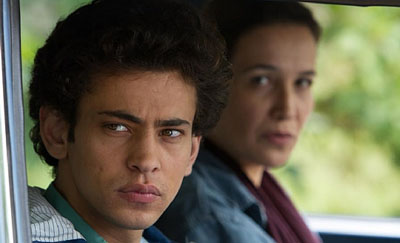 DANCING ARABS
DANCING ARABS(not rated)
*** (out of 5)
STARRING
Tawfeek Barhom as EYAD
Yaël Abecassis as EDNA
Alie Suliman as SALAH
Michael Moshonov as JONATHAN
Danielle Kitzis as NAOMI
Marlene Bajali as AISHA
Laëtitia Eïdo as FAHIMA
Razi Gabareen as YOUNG EYAD
Norman Issa as JAMAL
Loai Nofi as WAJDI
Studio: The Israel Film Fund
Directed by: Eran Riklis
BY KEVIN CARR
Much of Israeli cinema – especially that which receives funding from the film funds – tend to be issue driven. Because the industry is still pretty small, the budgets are tight, and there just isn’t the means to produce tent-pole popcorn entertainment like an Israeli version of “Transformers.”
Instead, the bulk of the productions touch upon subject matter that reflect the cultural issues that Israelis face. Some of these themes include the clash between old values and newer ones, as well as themes of the Holocaust. However, one of the most prevalent issues examined in Israeli cinema seems to be the historic and ongoing tensions between the Jewish state and Palestine.
Striking at the heart of this issue is Eran Riklis’ new film “Dancing Arabs,” which was the opening film for the Jerusalem Film Festival. (The gala screening was, ironically enough, postponed and later canceled because of escalating tensions between Israel and Palestinians in the Gaza Strip.)
Based on the book by Sayed Kashua, “Dancing Arabs” tells the story of a man trapped between two cultures. Eyad (Tawfeek Barhom) grew up with his father heavily involved in freedom fighting for Palestine. Often detained as a terrorist, Eyad’s father had a zealous belief in Palestine and rejoiced, for example, when the first Gulf War commenced. (He changed his tune quickly when he saw how out-matched Iraq was, which served as another defeat for his core values.)
When Eyad reaches secondary school, he has the opportunity to attend a prestigious Jewish boarding school. Eyad is just out to get an education, but he faces racial tensions both at school and at home. His father jokingly (but not entirely) suggests he could build the first atomic weapon for Palestine, while his classmates ridicule him for his background. Things become more tense when he starts a relationship with Naomi (Danielle Kitzis), a Jewish girl at his school.
Eyad finds himself being pulled in both directions – to be Arab for his family history and to be Jewish to fit in better. Soon, he discovers a way that he can bridge the gap between both worlds, but as he gets deeper into it, he finds that he might have to give up his original identity.
The most impactful element to “Dancing Arabs” to me, coming at the film from a naive but sympathetic position, is how the overall conflict creates victims in everyday life. Eyad is not in the thick of a military battle, but he is in the middle of a cultural one. Propaganda and racist signs are literally seen throughout the film in the background, warning of dangers in mixing Arab and Jewish heritage. It’s backwards thinking being presented passively as a sign of those times, and it reinforces the unpleasantness of these sentiments without preaching about them.
I saw this film after it was delayed for security reasons, in the shadow of air raid sirens sounding in the skies of Jerusalem, making it a chillingly relevant film for the festival. However, the issues tackled by Riklis in “Dancing Arabs” transcend the military action. These are struggles of human beings, not militaries and nations, and that’s the core of the tragedy of this situation.
Even for someone like myself, coming from completely outside both the Jewish and Arab cultures, I can relate to what’s happening on the screen. Riklis directs the film with a very empathetic hand. It allows us to see the silliness of such bitter cultural hatred, but it also shows us that these feelings did not evolve in a vacuum.
Sadly, “Dancing Arabs” also shows that the victims of the conflict are not only those killed in the battlefield, but people whose spirits can be crushed by circumstance. While a humorous film at many turns, this makes “Dancing Arabs” into a broad tragedy, and one that never gets a satisfying resolution, not because of the fault of the director or the story but rather the fault of how imperfect our world really is.

I really liked your review but i think in my opinion that it’s worth more than 3 out of 5 stars, because, when i saw that movie i didn’t come with great expectation to see more than an average one and i think this was a very good movie, that makes you think about the complicated situation and realize how inconvenient this situation is for both sides (the relationship between Naomi and Eyad).